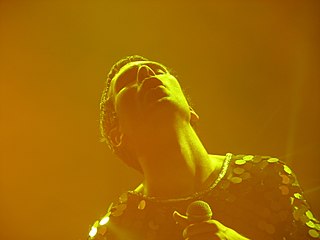A Quote by Aaron Sorkin
I consider plot a necessary intrusion on what I really want to do, which is write snappy dialogue. But when I'm writing, the way the words sound is as important to me as what they mean.
Related Quotes
When I go to the cinema, I want to have a cinematic experience. Some people ignore the sound and you end up seeing something you might see on television and it doesn't explore the form. Sound is the other picture. When you show people a rough cut without the sound mix they are often really surprised. Sound creates a completely new world. With dialogue, people say a lot of things they don't mean. I like dialogue when it's used in a way when the body language says the complete opposite. But I love great dialogue I think expositional dialogue is quite crass and not like real life.
There's a difference between writing, the written word, and music. When you have the blank page it doesn't make a sound, which is like what happens to me every night when I'm playing. There is that crazy moment: the first mark you make on the page. But sound can inspire sound, in a way that words can't inspire words - at least for me. The nature of sound itself is still a huge mystery to me. I'm very happy about that.
I can work a lot faster when I'm writing a screenplay than when I'm writing a play because, if I'm having a problem with a scene or something, I can just be writing it in a way where there's no dialogue, or find a way to make sound do the work that I want to do or a close-up do the work that I need to do.
It's something that's difficult to explain but I think all writers work this way to some extent, whether we're aware of it or not. For me, writing has little to do with thinking. I don't want to control the narrative. I listen to the rhythm of the words and dialogue and try to give the characters the space in which to say and do what they want without intervening too much.
I think I have a vested interest in thinking that the lyrics are important, but I think for us it's important that we all write things that mean something to us, and I think we're not really in the business of writing la-la-love-you chart pop songs. It needs to have a personal pulling in the gut for me, to want to write anything about it.
I became much more interested in plot when I really didn't consider myself a writer anymore. When I was in an art context and I started to do installations, that was when writing of mine almost returned to fiction. Earlier I felt like I didn't have anything to write about, I could only concentrate on the page, I could only concentrate on words.
When I'm writing a script, before I can write dialogue or anything, I have two or three hundred pages of notes, which takes me a year. So, it's not like "what happens next." I've got things that I'm thinking about but I don't settle on them. And if I try to write dialogue before then, I can't. It's just garbage.
And then afterwards I worked in advertising for a year which taught me about writing even when you don't want to (laughter) because there's never a moment that you want to write about an Erickson cell phone but you have to. And that's really important you know obviously for the...like if you really want to write, you have to write every day no matter how you feel or you know. And then, yeah, and then I ended up working in TV and then from TV into movies and then directing, so.
For me, writing is a job. I do not separate the work from the act of writing like two things that have nothing to do with each other. I arrange words one after another, or one in front of another, to tell a story, to say something that I consider important or useful, or at least important or useful to me.
The way you write dialogue is the same whether you're writing for movies or TV or games. We use movie scriptwriting software to write the screenplays for our games, but naturally we have things in the script that you would never have in a movie script -- different branches and optional dialogue, for example. But still, when it comes to storytelling and dialogue, they are very much the same.
I have a really good idea of who my readers are and always write with a sensitivity to my audience. I use the F word when necessary, but there are words I won't use, mainly because I don't like them. I don't write about body parts when I write about sex. It's not about the physiological, it's more important for teens to read about the emotional aspects. I do think there are times when self-censorship is important.




































